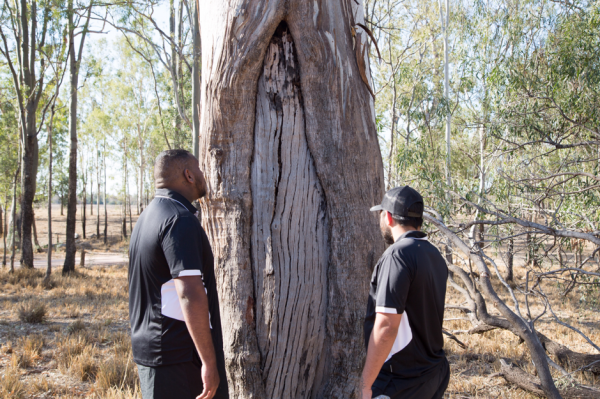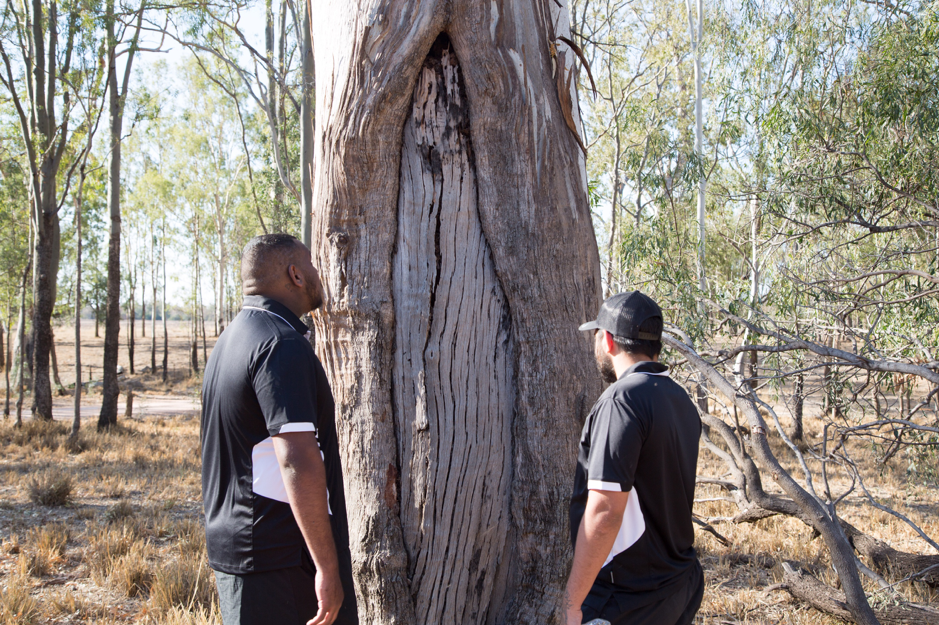
This community news report follows the Bigambul 2019 Youth Summit; held over 5days between October 27 and October 1, 2019 in Goondiwindi.
Bigambul Native Title Aboriginal Corporation (BNTAC) would like to acknowledge the financial contribution provided by QGC Shell that supported the convening and delivery of the 2019 Bigambul Native Title Youth Summit.
We would also like to acknowledge the contribution of Australian Rail Track Corporation (ARTC) – Inland Rail.
Special thanks and acknowledgement also go to Bigambul Elders who participated as part of the event’s delivery over the 5-days. We would also like to thank and acknowledge participating young people and our emerging leaders for their attendance, commitment and contribution to the Summit.
The fundamental aim of the Bigambul 2019 Youth Summit was to engage Bigambul young people as part of 5-days of dynamic and interactive Nation Building. Key underpinning objectives included:
- Facilitating opportunity for a representative group of Bigambul young people to come together to engage in cultural learnings, knowledge transfer and skill and capability development
- Actively supporting the cultural and social connection and identity of Bigambul young people, and engagement of the next generation as part of native title and nation building
- Promote and facilitate the cultural, social and economic aspirations and participation of Bigambul young people
- Provide tangible opportunity to receive the views and input of young people on their needs, aspirations and priorities, so that the voice of our youth is heard and represented as part of current and future strategies and actions
- Develop the foundation for the establishment of an ongoing Bigambul Youth Advisory Council that will continue to operate beyond cessation of funding
The primary intended outcomes/outputs to result from the Summit included:
- Development of a comprehensive post Summit report documenting key outcomes and recommendations resulting from the Summit, including the outcomes of the Bigambul 2019 Young People’s Survey
- The Bigambul Young People’s Strategy – to be developed based around the outcomes and recommendations of this report and also the leadership and contribution of the now formed Youth Advisory Council
- Establishment of the Bigambul Youth Advisory Council
BNTAC received a total of twenty-five (25) registrations from interested young people to attend the Bigambul 2019 Youth Summit. From the twenty-five young people that registered, fourteen (14) were able to attend.
The Summit was co-facilitated by BNTAC Youth Directors, Lilly Graham and Brenton Sefo-Wallace, in combination with presentations by BNTAC Executive Director, Justin Saunders, and sessions, presentations and group workshops led by Bhiamie Williamson and Stacey Little from the Australian Institute for Aboriginal & Torres Strait Islander Studies (AIATSIS).
Key outcomes / take-aways resulting from the 5-day Summit and the feedback and contribution of Bigambul young people, included:
- Antecedents for a youth safe space whereby young people felt comfortable and confident to express themselves, included: respect and being open and receptive to questions; effective communication; confidence and not being shame; a principle of no wrong answers or questions; support and encouragement for one another; being active learners and contributors.
- In exploring what it means to be Bigambul, young people identified the importance of culture, land and water, the importance of working on country, language; and cultural awareness and knowledge of our traditions – including Men’s and Women’s business. With this also came the collective frustration at the loss of knowledge and the impact of our nation’s history. They also identified opportunities to maximise the freedom’s that Bigambul young people experience today, through Native Title rights.
- The former connected to identified barriers / challenges holding the Bigambul nation back; with cultural paralysis and a lack of knowledge across and transfer between generations highlighted as a lead factor. Other identified issues included: previous lack of opportunities to come together; divisions at the family and community levels (i.e. factionism) and lateral violence; trauma; lack of understanding of Native Title and Indigenous corporations; and distance and travel.
- The latter connected to what was a consistent point raised through the Summit, which was the advocated need, use and place for a dedicated place / space on Country for young people / Bigambul community members to be able to visit and stay on.
- The day on Country with Elders provided positive and active opportunity for youth to actively engage in learning and connecting with country, water, culture and each other. Feedback highlighted the particular appreciation of having this opportunity – with many youth delegates expressing they had not had an opportunity like this before.
- Antecedents for effective leadership as identified by Bigambul young people, included:
- Listening to your people
- Being united in our Vision
- Passion
- “Bigambul leadership should bring Bigambul people together”
- Extending on the former, expectations by young people of being a Bigambul leader, included:
- Confidence
- Support and patience
- Time management and efficiency
- Motivation and passion
- Respect and positivity
- Knowledge, understanding – inter-generational
- Active communication
- Social awareness
- Being a strong leader also means being strong in identity. Key enablers for strong identity as expressed by Bigambul young people, included: having a strong voice; knowledge and learning; knowing your language; connection; understanding traditional lore; adaptability; connecting to country; and healing – of self and collectively.
- There were common themes expressed by young people as being their priorities and aspirations. Highlighted themes, include:
- The importance of knowledge seeking and continuous learning – including in regard to culture, language and country
- Study, training/education and employment
- Learning more about Native Title
- Being rich in family and community
- United in vision for our Nation
- Confidence and strong voice
- Having a base on Country to come to
- Commonly reported obstacles and challenges associated with young people achieving their aspirations, included:
- Skills and knowledge shortfalls and gaps
- Lack of confidence
- Support and networks
- Funds and resources
- Suitable agreements
- Cultural knowledge
- Distance and planning
- Self (mental obstacles)
- Key reported strategies needed to support young people in achieving their priorities and aspirations, included:
- Having a base on country
- Formation of a Bigambul Youth Advisory Council
- More development, training and work opportunities
- Opportunities for work through Native Title
- Strategic partnerships
- Priorities for the Bigambul nation and BNTAC as expressed by young people primarily centred around:
- More work and economic development opportunities
- More dedicated youth programs and establishment of the Bigambul Youth Advisory Council
- More working on country opportunities
- Convening the Bigambul Youth Summit as an annual event
- Development of a Bigambul Youth Engagement Strategy
- Broader community engagement and reach
- The Youth Advisory Council was established as a key outcome of the Summit. Seven (7) nominations were received and accepted. The scope of the group will be to:
- Allow youth an embedded mechanism to have their say
- Engage with broader community
- Bring young people together
- Organise the annual Youth Summit
- Report to the Board
These outcomes were supplemented by key findings from the Bigambul Young People’s Survey and Post Summit Feedback form. The post-Summit feedback form elicited the following key trends:
- Ninety per cent (90%) of youth delegates reported their Summit experience as being ‘Excellent’.
- The way family came together; being on and connecting with Country; and learning about our nation’s history, were again lead self-reported outcomes / take-aways by participants. Participants also expressed their enjoyment of being able to speak and express themselves freely.
- Suggested Summit improvements largely connected with the verbal Summit feedback provided on day 5, with suggestions for: more family involvement; more activities; ensuring this is an annual event for future generations; and increasing next events’ engagement and reach.
- Ninety per cent (90%) of participants expressed they would be interested in being contacted by BNTAC for future engagement opportunities.
The survey also sought to obtain further input around Young People’s priorities’ and aspirations, now and into the future. Key priorities for the Bigambul Nation as identified by Young People, include:
- Climate and environment
- Training, education and employment
- Mental health and social and emotional wellbeing
- Drug and alcohol related issues
- Safety
- Poverty and disadvantage
- Health and physical wellbeing
- Housing
These and other outcomes were merged with verbal feedback and input provided over the Summit’s 5-days, to develop a comprehensive report and set of recommendations.
Based on the key findings and outcomes resulting from the Bigambul 2019 Youth Summit and the Young People’s Survey and Summit Feedback Form, the following key recommendations were developed:
- The Bigambul Youth Summit event should be established as an annual initiative by BNTAC for current future generations, with the Bigambul Youth Advisory Council to take a lead role in the planning, coordination and delivery of subsequent years’ events.
- Extending on the former, maintain momentum of the Bigambul Youth Advisory Council now that it is established, including progress to coordinate a first meeting of the Council to:
- Develop a Terms of Reference and mutually agreed Council Rules
- Meeting frequency
- Social media and communication platforms
- Roles and responsibilities
- Scope available funding and resource supports for the Council
- Develop a Bigambul Young People’s Engagement Strategy that outlines a clear plan for the current and future engagement of Bigambul young people.
- Develop a dedicated Bigambul Young People’s Strategy that articulates our youth’s united vision for our Nation; and responds to the mapped personal and collective priorities, aspirations and challenges of Bigambul young people – as expressed over the Summit’s 5 days and based on mapped priorities from the Young People’s Survey. This will be progressed with and through the Bigambul Young People’s Advisory Council.
- BNTAC to continue to explore and grow training, education and employment opportunities for Bigambul Young people – including through expanded strategic relationships and agreements; and maximisation of Native Title rights and working on country opportunities.
- BNTAC to scope and explore opportunities to have a dedicated space / place on Country for young people where they can come and visit / stay.
To access videos regarding the Summit and profiling of specific activities undertaken (i.e. Our day on Country) please follow the below media links:
BIGAMBUL YOUTH SUMMIT (LONG FILM VERSION)
https://vimeo.com/388091690/0237cb5d02
BIGAMBUL YOUTH SUMMIT (SHORT FILM VERSION)
https://vimeo.com/388091894/d2f3dea384
WHAT DOES IT MEAN TO BE BIGAMBUL
https://vimeo.com/388091950/86d519b7ab
BEING ON BIGAMBUL COUNTRY
https://vimeo.com/388091636/0f63628135
BNTAC would like to offer special thanks to QGC for supplying a videographer to record and compile the above resources.
